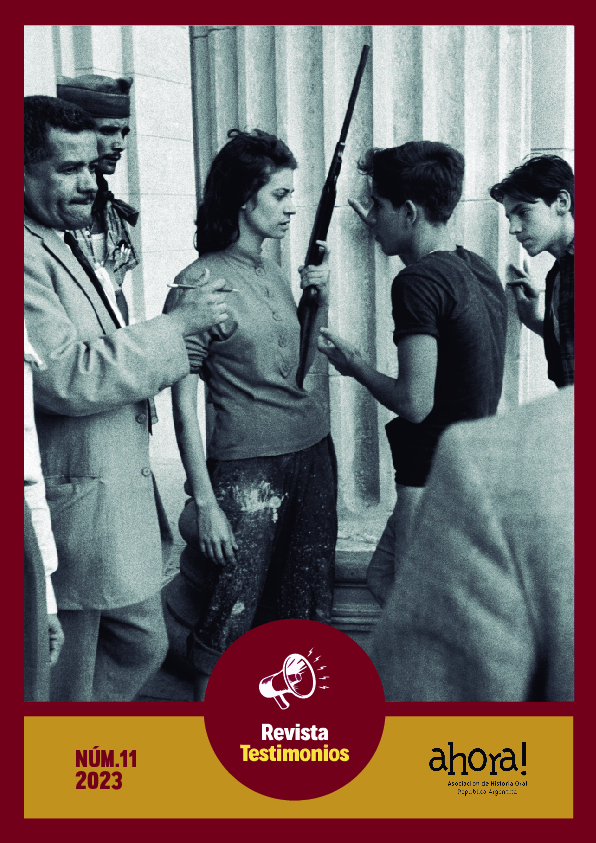History and Objectivity. Emotional distance in analyzing the Basque Conflict
Keywords:
Inter-subjectivity, Generation, Objectivity, Oral history, TerrorismAbstract
This article proposes a dialogue between the historiography of modern Spanish history and the ethnographic process I lived through while I was researching the Basque conflict. The narratives explored in this research will help us understand other cases in which oral history and political violence converge in a single text. Oral history was born in the middle of the twentieth century but it has become a common practice in the twenty first century. However, there is a lack of self-questioning by historians when they carry out their interviews. If the purpose of oral history is to hear the stories of persons who witnessed important historical events, then surely, we historians are witnesses to these testimonios during the interviews. We represent the place were the narrator places his life story.
References
Aguilar Fernández, P. (1996). Memoria y olvido de la guerra civil española. Madrid: Alianza.
Alcedo, M. (1996). Militar en ETA: historias de vida y muerte. San Sebastián: Haranburu.
Angé, O., y Berliner D. (2015). “Introduction: Anthropology of Nostalgia – Anthropology as Nostalgia”. En: Angé, O. y David Berliner, Anthropology and Nostalgia. New York and Oxford: Berghahan.
Appaduri, A (ed). (1986). La vida social de las cosas. Cambridge: Cambridge University Press.
Aretxaga, B. (2005). States of Terror. Reno: University of Nevada Press.
Balfour, S. (1989) Dictatorship, Workers and the City: Labour in Greater Barcelona since 1939. Oxford: Clarendon Press.
Beorlegui, D. (2017). Transición y melancolía. La experiencia del desencanto en el País Vasco (1976-1986). Madrid: Postmetrópolis.
Buckley, H. (2013). Life and Death of the Spanish Republic. A Witness to the Spanish Civil War. London and New York: Tauris, 1940.
Burguiere, A. (2006). The Annales School. A New Approach to the Study of History. Paris/New York: Odile Jacob.
De Moraes Ferreira, M. (2002). “Historia oral: una brújula para los desafíos de la historia”. En: Historia, Antropologia y Fuentes Orales. Escenarios migratorios. Editado por Universitat de Barcelona y Asociación Historia y Fuente Oral.
Dilean, J., y Rapapport, J. (2018). Imagining Latin American Social Science from the Global South. Orlando Fals Borda and Participatory Action Research. Latin American Research Review, N° 53 (3), p. 597-612. DOI: http://doi.org/10.25222/larr.164
Dolphijn, R., Van der Tuin, I. (2012). New Materialism: Interviews & Cartographies. Ann Arbor: Open Humanities Press.
Elorza, A., Garmendia, J. M. Jaúregui, G. y Domínguez F. (coords). (2000). La historia de ETA. Madrid: Colección historia.
Fraser, R. (1979). Blood of Spain: An Oral History of the Spanish Civil War. New York: Pantheon Books.
Fraser, R. (2010). In Search of a Past. New York: Verso.
Fusi, J. P. (1984). El Pais Vasco: Pluralismo y Nacionalidad. Madrid: Alianza Editorial.
Garrido Otoya, M. (2020). Historia de las emociones y los sentimientos: aprendizajes y preguntas desde América Latina. Historia Crítica. Octubre, N° 78. DOI: https://doi.org/10.7440/histcrit78.2020.02
García González, A. (2019). Desde el conflicto. Epistemología y política en las etnografías feministas. Antípoda. Revista de Antropología y Arqueología. Abril-junio, p. 1-48.
Geertz, C. (1973). The Interpretation of Cultures. New York: Basic Books.
Graham, H. (1995). Introduction. Culture and Modernity. The Case of Spain. En: Graham, H. y Joe Labanyi, Spanish Cultural Studies; An Introduction. The Struggle for Modernity. New York: Oxford University Press.
Graham, H. (2005). The Spanish Civil War. A Very Short Introduction. Oxford: Oxford University Press.
Hamilton, C. (1999). “The Gender of ETA and Radical Basque Moral Community”. Tesis doctoral. Royal Holloway University of London.
Hamilton, C. (2008). On Being a 'Good' Interviewer: Empathy, Ethics and the Politics of Oral History. Oral History 36, N° 2, p. 35-43. [Consultado el 19 de junio del 2020]. Disponible en: www.jstor.org/stable/40179990
Harari, Y. (2014). Sapiens. (De animales a Dioses). Barcelona: Debate.
Labanyi, J. (2007). Memory and Modernity in Democratic Spain: The Difficulty of Coming to Terms with the Spanish Civil War. Poetics Today. N° 28, (1): p. 89–116. DOI: https://doi.org/10.1215/03335372-2006-016
Labanyi, J. (2010). Doing things: Emotion, Affect and Materiality. Journal of Spanish Cultural Studies, 11: 3-4, p. 223-233. DOI: https://doi.org/10.1080/14636204.2010.538244
Le Goff, J. y Nora, P. (edit). (1974) Constructing the Past: Essays and Historical Methodology. Cambridge: Cambridge University Press.
Marco, J. (2022). “El historiador introspectivo. Mirar hacia adentro para mirar hacia afuera”. En La guerra de España en nuestras raíces. Ancestros, subjetividad y el oficio del historiador. Madrid: Postmetrópolis Editorial.
Mosse, G. (2013). Confronting History. A memoir (George L. Mosse Series in Modern European Cultural and Intellectual History). Wisconsin: University of Wisconsin Press.
Muro, D. (2008) Ethnicity and Violence: The Case of Radical Basque Nationalism. (2008). New York: Routledge.
Nichanian, M. (2009). The Historiographic Perversion. New York: Columbia University Press.
Nietzsche, F. (1984). Mi Hermana y yo. Madrid: EDAF.
Nietzsche, F. (2008). Aurora. Caseros: Gradifco.
Novick, P. (1988). The Noble Dream. The “Objectivity Question” and the American Historical Profession. New York: Cambridge University Press.
Passerini, L. (1996). Autobiography of a Generation. Italy, 1968. Middletown, Connecticut, Weselyan University Press.
Payne, Stanley G. (1969). The Spanish Revolution. New York: Norton and Company.
Preston, Paul. (1995). The Politics of Revenge: Fascism and the militin 20th century Spain. London: Routledge.
Preston, P. (2012). The Spanish Holocaust: Inquisition and Extermination in Twentieth-Century Spain. London: Harper Press.
Sheftel, A. y Zembrzcki, S. (2013). Oral History Off the Record. Toward and Ethnography of Practice. New York: Palgrave Macmillan.
Thomas, H. (1965). The Spanish Civil War. Victoria: Penguin Books, 1965.
Zweig, St. (2013). The World of Yesterday. Nebraska: University of Nebraska.
Downloads
Published
Issue
Section
License
Copyright (c) 2022 Nicolás Buckley

This work is licensed under a Creative Commons Attribution-NonCommercial-ShareAlike 4.0 International License.
No se permite un uso comercial de la obra original ni de las posibles obras derivadas, la distribución de las cuales se debe hacer con una licencia igual a la que regula la obra original.













